The association between adolescents' knowledge and perception of HPV vaccination and parents' characteristics: A cross-sectional study
IF 2.2
4区 医学
Q1 NURSING
引用次数: 0
Abstract
Background
In Italy, the anti-Human Papillomavirus (HPV) vaccination campaign began in 2008. To date, despite the effectiveness and safety of HPV vaccines, coverage among Italian adolescents is still suboptimal. Evidence suggests that different factors could influence parents' choices regarding their children's vaccination uptake.
Aim
This study aimed to assess the association of parents' sociodemographic characteristics and vaccine hesitancy with adolescents' perceptions and knowledge of the HPV/HPV vaccine.
Methods
A cross-sectional study was conducted among Italian students aged 11–13 and their parents. The data were collected by structured questionnaires including sociodemographic questions, the HPV Adolescent Vaccine Intervention Questionnaire (HAVIQ) to assess students' knowledge and perceptions on HPV/HPV vaccination, and the Parent Attitudes about Childhood Vaccines (PACV) Survey to measure parents' vaccine hesitancy.
Results
This study involved 74 adolescents and 74 parents. Overall, adolescents showed high levels of confidence in “involvement in decision-making”, “self-efficacy”, “feelings” and “knowledge” factors of the HAVIQ. 94.6 % of parents were categorized as “non-hesitant” reporting a PACV overall score < 50. Having one or both parents with a university degree in the family was statistically associated with higher students' knowledge (p = 0.048) and lower feelings of fear and anxiety (p = 0.011).
Conclusions
This study identified parents' characteristics related to adolescents' knowledge and perceptions regarding the HPV/HPV vaccination. Specifically, results showed that parents' educational level was associated with adolescents' knowledge and feelings about HPV and HPV vaccination. These factors in turn could play a pivotal role in a shared vaccine decision-making process between parents and their children.
青少年对HPV疫苗接种的知识和认知与父母特征之间的关系:一项横断面研究。
背景:在意大利,抗人乳头瘤病毒(HPV)疫苗接种运动始于2008年。迄今为止,尽管HPV疫苗的有效性和安全性,但意大利青少年的覆盖率仍然不够理想。有证据表明,不同的因素可能影响父母对孩子接种疫苗的选择。目的:本研究旨在评估父母的社会人口学特征和疫苗犹豫与青少年对HPV/HPV疫苗的认知和知识的关系。方法:对意大利11-13岁学生及其家长进行横断面调查。数据通过结构化问卷收集,包括社会人口学问题,HPV青少年疫苗干预问卷(HAVIQ)评估学生对HPV/HPV疫苗接种的知识和认知,以及家长对儿童疫苗的态度(PACV)调查衡量家长对疫苗的犹豫。结果:本研究涉及74名青少年和74名家长。总体而言,青少年在HAVIQ的“参与决策”、“自我效能”、“感觉”和“知识”因素上表现出较高的自信水平。94.6%的家长被归类为“不犹豫”,报告了PACV总分。结论:本研究确定了父母的特征与青少年对HPV/HPV疫苗接种的知识和看法有关。具体而言,结果显示父母的文化程度与青少年对HPV和HPV疫苗接种的知识和感受相关。这些因素反过来可能在父母和孩子之间共同的疫苗决策过程中发挥关键作用。
本文章由计算机程序翻译,如有差异,请以英文原文为准。
求助全文
约1分钟内获得全文
求助全文
来源期刊

Applied Nursing Research
医学-护理
CiteScore
4.50
自引率
0.00%
发文量
65
审稿时长
70 days
期刊介绍:
Applied Nursing Research presents original, peer-reviewed research findings clearly and directly for clinical applications in all nursing specialties. Regular features include "Ask the Experts," research briefs, clinical methods, book reviews, news and announcements, and an editorial section. Applied Nursing Research covers such areas as pain management, patient education, discharge planning, nursing diagnosis, job stress in nursing, nursing influence on length of hospital stay, and nurse/physician collaboration.
 求助内容:
求助内容: 应助结果提醒方式:
应助结果提醒方式:


